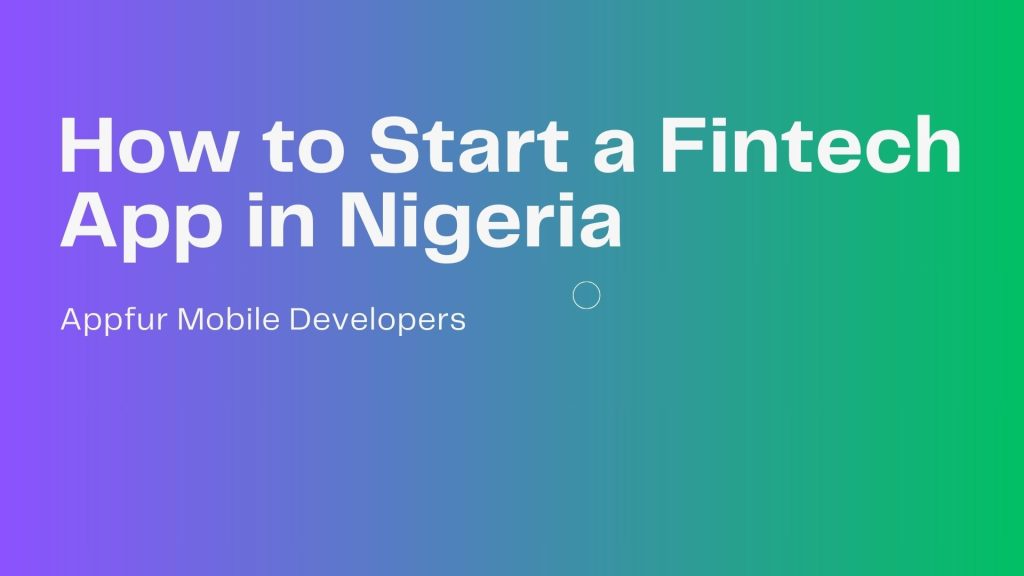The fintech industry is thriving in Nigeria, driven by a growing digital economy and a young, tech-savvy population. If you’re considering building a fintech app in Nigeria, you’re entering a market with enormous potential. Here’s a step-by-step guide tailored for the Nigerian context.

Step 1: Define Your Niche and Target Audience
Nigeria’s fintech sector spans various niches, including:
- Mobile Payments: Facilitating peer-to-peer transfers and bill payments.
- Digital Lending: Providing loans to underserved populations.
- Wealth Management: Offering investment opportunities like stocks and mutual funds.
- Cryptocurrency: Enabling crypto trading and wallet services.
- Financial Inclusion: Bringing banking services to unbanked and underbanked communities.
Identify your target audience and their specific needs. For instance, are you targeting small business owners who need affordable payment solutions, or are you creating a savings platform for young professionals?
Step 2: Understand Nigeria’s Regulatory Landscape
Navigating Nigeria’s regulatory framework is critical for a successful fintech app. Key considerations include:
- Central Bank of Nigeria (CBN) Regulations: Obtain the necessary licenses such as a Payment Service Bank (PSB) license or a Mobile Money Operator (MMO) license.
- Data Protection: Comply with Nigeria’s Data Protection Regulation (NDPR) to safeguard user information.
- Anti-Money Laundering (AML) and Know Your Customer (KYC): Implement robust KYC processes to meet financial compliance standards.
Engage legal experts who specialize in fintech to guide you through the licensing process.
Step 3: Develop a Feature List
Focus on features that address local user needs, such as:
- Offline Accessibility: Features that work with USSD for users without internet access.
- Instant Payments: Seamless transfers between banks and mobile wallets.
- Multi-Currency Support: Options for Naira and popular cryptocurrencies.
- Bill Payments: Utilities, airtime recharge, and subscription services.
- Security: Two-factor authentication and biometric login.
Optional features:
- Savings and investment tools with competitive interest rates.
- AI-driven credit scoring for loan applications.
- Integration with e-commerce platforms.
Step 4: Choose the Right Technology Stack
Select a technology stack optimized for scalability and security. Consider:
- Backend: Use frameworks like Node.js or Python (Django) for rapid development.
- Frontend: Leverage React or Angular for a responsive interface.
- Database: PostgreSQL or MongoDB for secure and efficient data handling.
- Payment APIs: Integrate with local providers like Paystack, Flutterwave, or Monnify.
- Cloud Hosting: Use AWS or Azure for reliable infrastructure.
Step 5: Design a User-Centric UI/UX
A fintech app’s success depends on its usability. Keep in mind:
- Localization: Support multiple Nigerian languages and cultural preferences.
- Simplicity: Make navigation intuitive, especially for first-time users.
- Trust: Use familiar colors and symbols that inspire confidence in financial transactions.
Tools like Figma and Adobe XD can help you design and prototype your app.
Step 6: Develop and Test the App
- Iterative Development: Use agile methodologies to build your app in phases.
- Security Measures: Encrypt sensitive data and implement secure payment gateways.
- Testing: Perform extensive testing, including:
- Functional Testing
- Usability Testing with local users
- Security and Penetration Testing
Step 7: Launch and Market Your App
An effective launch strategy is crucial for success:
- Beta Testing: Release the app to a select group of users for feedback.
- Partnerships: Collaborate with local banks, telecom providers, and retailers.
- Marketing: Use social media, influencer partnerships, and targeted ads to create awareness.
- App Store Optimization (ASO): Optimize your app’s listing for local keywords.
Step 8: Maintain and Scale
Post-launch, focus on:
- User Feedback: Continuously improve your app based on user input.
- Regular Updates: Add new features and fix bugs promptly.
- Scaling: Plan for increased traffic by optimizing your infrastructure.
Final Thoughts
Starting a fintech app in Nigeria offers immense opportunities, but it also comes with challenges like regulatory hurdles and fierce competition. By addressing local needs, ensuring compliance, and delivering a seamless user experience, you can build an app that stands out in this dynamic market. Stay innovative and user-focused to succeed in Nigeria’s fintech ecosystem.
If your looking to build a fintech app contact us at Appfur.com.ng or Call +234 916 674 3190
We design and build high-quality, scalable mobile apps tailored to your needs.
Let’s talk! Message us on WhatsApp now: Click Here
Your next big app starts here!
